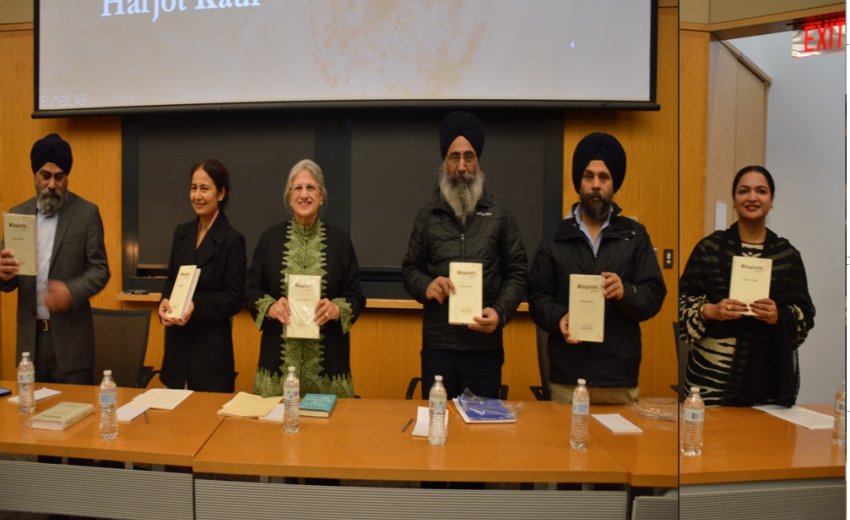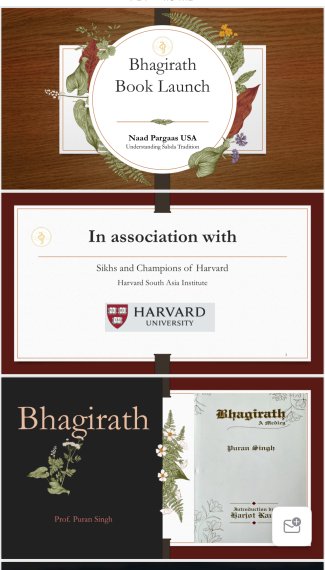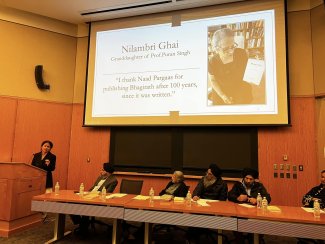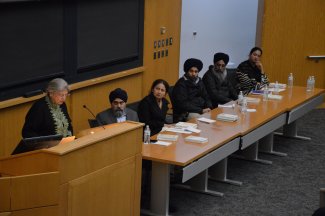The first edition of novel Bhagirath authored by Prof. Puran Singh was released at Harvard University, MA. This novel was published and released after a century of authorship. The book release event was organized by Naad Pargaas USA in association with Sikhs and Champions of Harvard and Harvard South Asia Institute. The event was attended by Dr. Harpreet Singh from Harvard University, Komal Kaur Dang - Great granddaughter of Bhai Vir Singh and her daughter Amrita Dang, Harjot Kaur who authored the introduction of the book, Prof. Jagdish Singh from Naad Pargaas Amritsar, Amandeep Singh from Naad Pargaas USA, and Gurpreet Kaur - Independent Researcher. Nilambri Ghai, Granddaughter of Prof. Puran Singh sent a video message to participate in the event. The event was also attended by eminent members of the community including literary author Sarbpreet Singh, who welcomed Komal Kaur Dang and Amrita Dang by presenting his book Nights of Restless Spirt published by Penguin.
Thanking the publishers Naad Pargaas USA, Nilambri Ghai expressed her gratitude to Harjot Kaur and Naad Pargaas for working tirelessly behind the scenes to publish this rare manuscript after a century. In his introductory note Dr. Harpreet Singh, welcomed the release of the text that was key to knowledge addition. He mentioned that despite writing in his local conditions, Prof. Puran Singh’s writings and concerns are global and universal. Although Prof. Singh could write fluently in English and Punjabi, however while writing in English, he presents East to the West.
Harjot Kaur in her opening comments gave a brief background about the importance of the texts that have remained almost extinct since a considerable time. She underlined that this was a historically momentous and spiritually auspicious occasion, that Bhagirath is being launched from the academic home of transcendentalism – Harvard, shared by renowned transcendentalist philosophers Emerson, Henery David Thoreau et al. Many writings of Prof. Puran Singh, celebrating the works of transcendentalist philosophers, were revived and refreshed with the launch of Bhagirath from same avenue. She mentioned the two significant events in the academic landscape of Punjab that took shape in the past 75 years, that included a lagging interest of Sikhs in Sabda philosophy after the Singh Sabha reforms and simultaneous resurrection of Marxism. This she mentioned led to a state of neglect in the domain of Sikh studies and therefore, many important texts like Bhagirath could not see the light of the day for a century. She further discussed the plot of the novel in which the life of Lahore searches for its soul in sainthood. Bhagirath’s character, she mentioned, exemplifies essence-existence simultaneity that corresponds to Sehaj (Tranquility)-Seva (Service) synchronicity.
Harjot Kaur’s talk was followed by Amandeep Singh’s paper. He identified three basic constituents of history, culture, and aesthetics that become prevalent through the plot of Bhagirath. He mentioned that the narration of Bhagirath is a discovery of a story from the facts of history. Bhagirath captures the psychology and unconscious aspects of life without theorizing or providing any metaphysical underpinnings. He further discussed that the element of culture that is influential in Punjabi lifestyle shapes public behavior through internalizations of propensities, skills, habits, and other modes of anthropological existence. Nevertheless, he said, culture contains no inherent capacity to create social or individual ideals from its inner constitution. In the absence of an organizing principle, it exhausts the very life on which it depends for its expression. Bhagirath in these ways draws upon the cosmic experience of religion that guides and creates an equilibrium within the culture. It carves a living space for mediation of Maryada into secular expression of life and creates an urge in human consciousness for exploring Sakhi tradition in secular living. Relating with a living experience of Sakhi for vertical elevation of flat consciousness is the basic theme that underpins the conceptual ground of Bhagirath.
In her talk from Empire to Nation, Gurpreet Kaur discussed the conditions in which the text Bhagirath was authored. The novel Bhagirath, she mentioned presents a very rich account of the internal dynamics within a civilization of a particular age as these transformations from a precolonial political system of Empire was accompanied by institutional establishment of a modern nation. These transformations, she mentioned, acted like a Copernican revolution of ideas, ideals, frameworks of understanding and structuring principles of a society that remains central in the plot of Bhagirath. She said that the novel is a society’s yearning for a prayer and simultaneously the reconstitution of society into its ideological frameworks as it transforms from empire to nation. This reconstitution, she mentioned resonates with Immanuel Kant’s idea of enlightenment that reflects a sense of self-struggle of a society in its process of emergence from a self-incurred tutelage towards its maturity, through the use of reason.
Prof. Jagdish Singh also commented on living experience that gets exhibited through Bhagirath. He presented a comprehensive view on Bhagirath. He said that the reception of knowledge system and also the religious perception gets conditioned in regular mundane living that can be refreshed through a dynamic engagement with literature. He mentioned that literature creates a harmony between time-bound and time-less dimensions of human consciousness. In certain ways, literature liberates human mind from its inner objectifications and harmonizes it with inner universality of our being. In absence of such harmony, only a psychological abstraction gets bounded within in human mind, but it does not impart any cosmological meaning to human consciousness or human living.
In her video message, Nilambri Ghai recalled that the manuscript of Bhagirath was authored in 1924-25. She talked about Prof. Puran Singh’s education, learnings, influences, and experiences that worked behind myriad of literary writings and speeches that were eventually produced and delivered. Giving a brief account of her family’s conscientious dispensation and logistical journey of publication of Prof. Puran Singh’s works during the past one hundred years, she expressed her satisfaction over the publisher’s efforts to publish Bhagirath that would have otherwise remained obscure from meaningful discourses and literary attention that the masterpiece novel deserves. She also gave an account of other such works that remained important in revising and promoting studies on Prof. Puran Singh’s works.
Komal Kaur Dang, great-granddaughter of Bhai Vir Singh expressed her gratitude to the organizers for arranging the event in publishing of Bhagirath. In particular, she thanked Nilambri Ghai for her invaluable gift of a masterpiece work by Prof. Puran Singh that widens the horizons of knowledge for many generations to come. She talked about the close association that Prof. Puran Singh shared with Bhai Vir Singh. She mentioned that the novel was unique and no other author of his time had discussed the circumstances of an age in such detail giving a rich account of social, political, and culturally dynamic environment of Lahore, Punjab, during the nineteenth and twentieth century. She discussed the role of written literature that was catalyzed during the age of Singh Sabha reforms. She ended her talk with a poem of Bhai Vir Singh quoted in Bhagirath.
On behalf of Naad Pargaas, Prof. Jagdish Singh, thanked the organizers from Harvard University, Dr Nilambri Ghai, Harpreet Singh, Komal Kaur Dang, Amrita Dang, Gurpreet Kaur, Jaspreet Singh, Amandeep Singh, Harjot Kaur, and members of the audience for participating and being present and in the success of the event.
The book can be purchased from Amazon in United States or from Naad Pargaas/Singh Brothers, in Amritsar, India.



